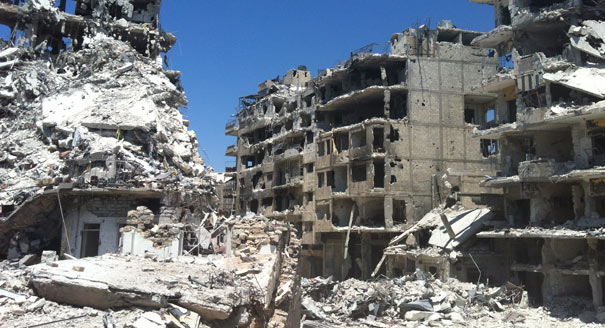So, Barack Obama has made a decision to punish Bashar Assad with a quick strike. I will not discuss the strike’s legitimacy, its consequences for Syria, and its ramifications for the entire Middle East. Almost everyone else talks about it, while I will focus specifically on the word “punish,” which seems inadequate and confusing. If we are to believe that the Assad regime indeed used internationally banned chemical weapons, then it has to be eliminated, not just punished. Otherwise, having survived such punishment, he may easily launch another chemical attack. It appears that by spanking a bully, Obama in effect forgives him and all but declares an intention to continue the “educational process.”
Or, alternatively, the punishment by cruise missiles is merely the first step in toppling the Syrian president. Then it is certain to be followed by a ground operation, which the United States and its allies vehemently rule out as of today. But the allies of the Syrian opposition are displaying their weakness by taking the fist step and being unwilling to take the next one. While the Syrian opposition is already unhappy with the quickness and limited scope of the promised punishment of their enemy.
Of course, punishment for using chemical weapons should be meted out, but it requires a consensus decision. Granted, the consensus on the Syrian crisis is virtually impossible. However, the so-to-say unilateral actions are also fraught with negative consequences. And is taking on the role of the Supreme Arbiter and usurping the right to punish someone acceptable even if guided by purely humanitarian, moral principles? It conjures up some associations with the Orwellian Big Brother.
A dangerous precedent is being created. Or is it, in fact, a new precedent? We have seen it before. Bin Laden punished America on September 11, or at least that is what he believed. I am aware that this comparison sounds too brash. But both then and now the punishers have used the very same term to describe their actions.
One more question that emerges is who may be punished next. After a short deliberation, Iran comes to mind as the most plausible answer. According to the above logic, it is to become the object of retribution for concealing the military component of its nuclear program. Even though its existence has not been officially proven, just like Assad’s culpability has not been directly established either. Thus Iran would have to be punished for the intention to commit a crime rather than for the crime itself. Moreover, if there is a strike against Iran, it will also not be motivated by seeking to topple the country’s regime. Incidentally, the punishment inflicted on Damascus, will surely prompt Teheran to accelerate the development of its nuclear program and along with it its nuclear weapons delivery means. And it is far more difficult to discipline a nuclear state, no matter how small it is.
It certainly will not be possible to punish the nuclear and militant North Korea either, even though all states, including those divided on the issue of Syria, are tired of the North Korean antics.
Punishing Syria creates another problem. If some—Americans and Europeans—are allowed to render punishment, why are not others allowed to do the same? One can always find those willing to “flog” the unruly ones around the world and in Eurasia. Not to topple them, but simply flog. Does it not remind you of the Russian-Georgian military conflict?
Finally, it is interesting how Obama’s phraseology is being taken by the Syrians themselves. Some probably say that it is not enough to merely punish Assad—according to them he deserves to be executed. While others are outraged: How this American dares to punish our president? Actually, the American punishment may turn Assad into a hero.
All in all, this quick punishing strike reveals Obama’s indecision and even his weakness. As one popular Russian song goes, “if you’re to shoot, then shoot!” It is more honest this way.
